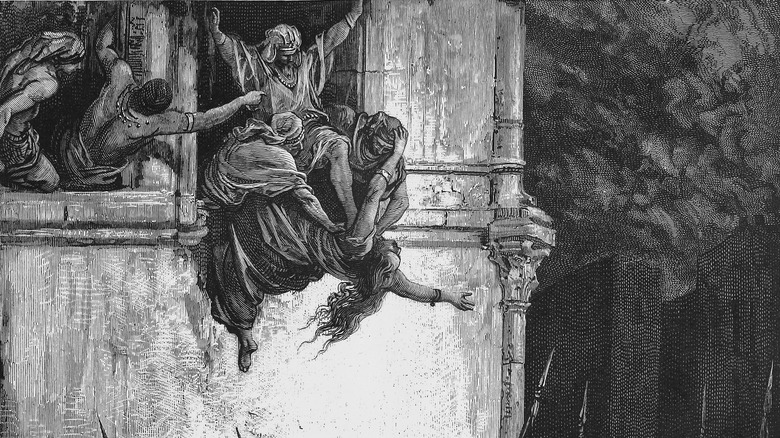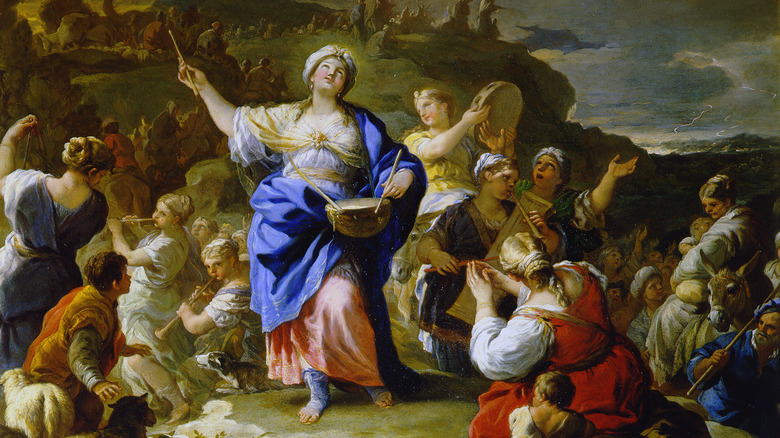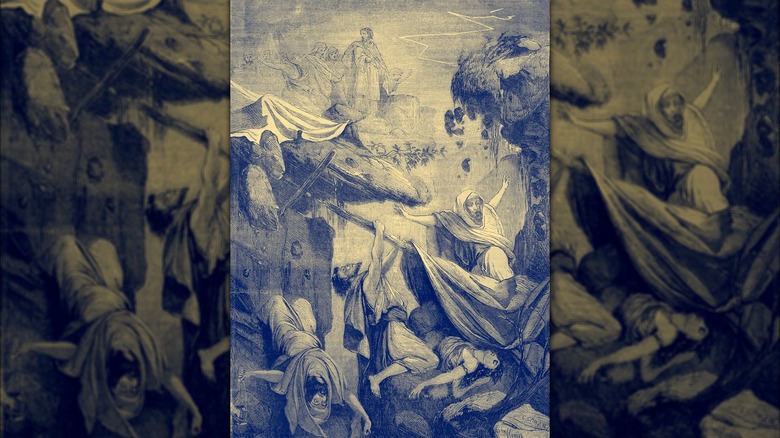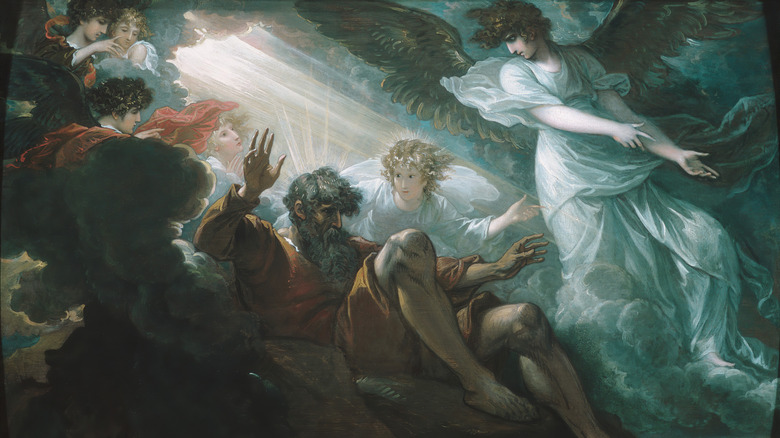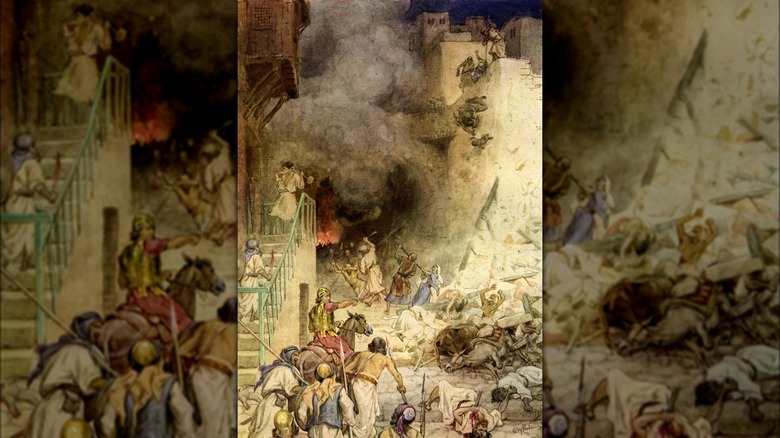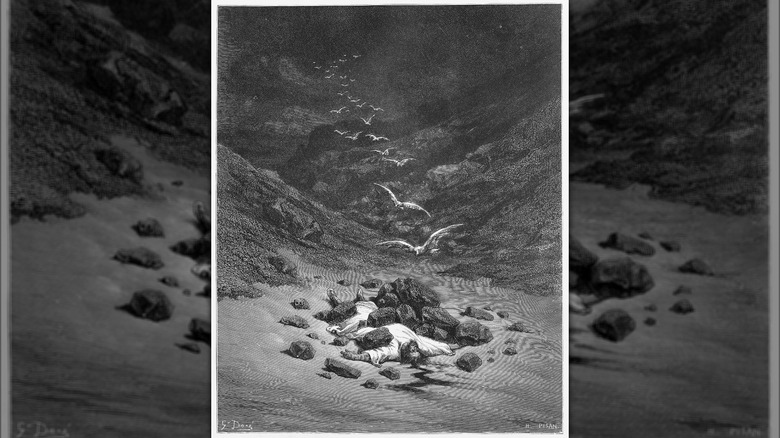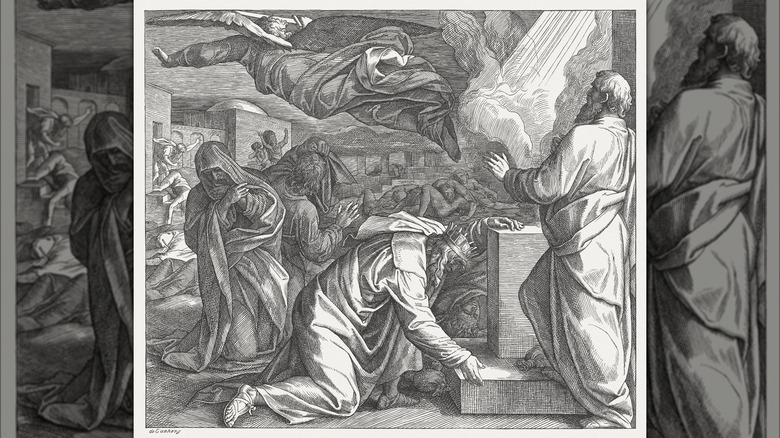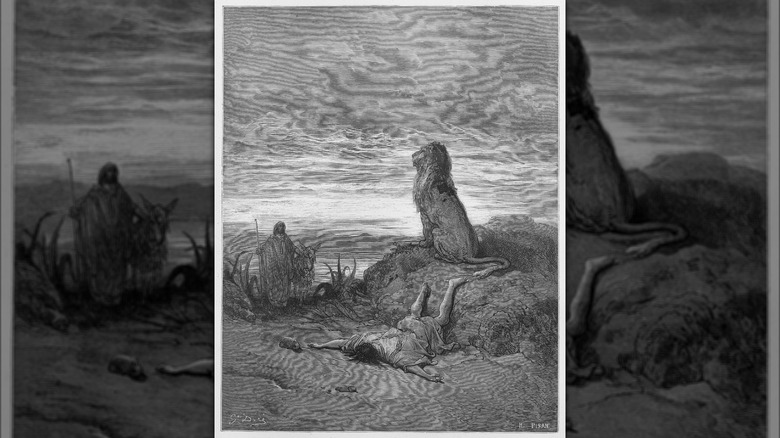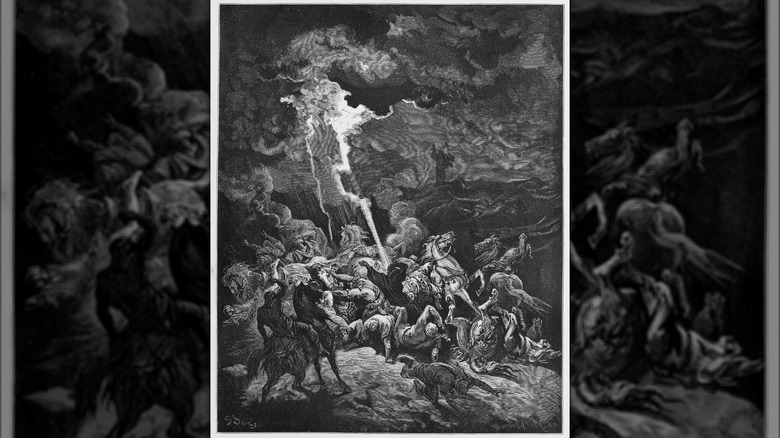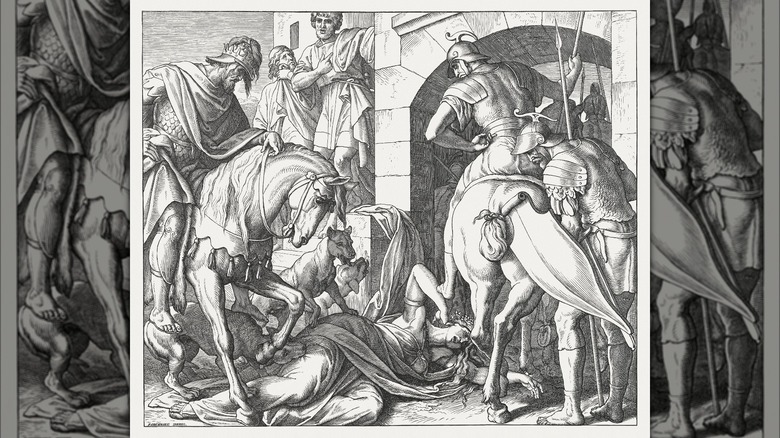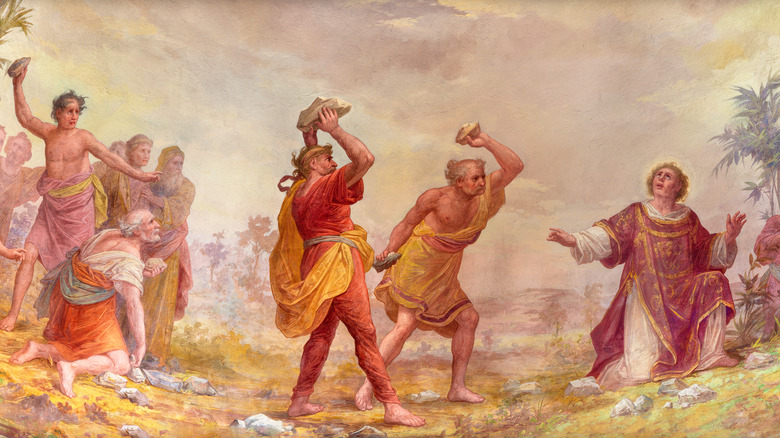The Most Tragic Bible Stories No One Ever Talks About
While the Bible and the Torah are places that many people of various religions turn to for comfort, it's amazing how many of the stories these books contain are downright tragic. Some of the saddest or most violent are well known. There was the time that King Herod killed all the young boys in order to make sure Jesus died. The Ten Plagues of Egypt wreaked all kinds of havoc on the people in that kingdom, until finally their firstborn sons were all killed. Adam and Eve got thrown out of paradise, and then one of their sons killed his brother. And of course, the crucifixion of Jesus was a painful and violent end that is described not once but four times in the gospels.
Maybe because there are so many dark stories to choose from in the Bible, some of the most tragic seem to have fallen through the cracks of society's collective memory. Some of these stories only take up a few lines, and many require a lot of context to understand why the bad thing was happening in the first place. And the vast majority are found in the Old Testament, where God tends to be a lot more angry and jealous than he is in the New Testament.
These stories are so ridiculously depressing that they deserve to be better known. The most tragic Bible stories no one ever talks about.
Miriam is punished with leprosy
In the Bible, Miriam the Prophetess was the sister of Moses. In Exodus, when the pharaoh ordered all young boys to be killed, it was Miriam who kept watch over Moses after she and their mother laid him in the river Nile. Once he was found there by the pharaoh's daughter, who decided to adopt him, Miriam arranged it so that he could live with his birth family for a while longer.
However, despite saving her brother's life, as well as being a prophet in her own right, Miriam was punished severely for disagreeing with Moses years later. While the Israelites were wandering in the desert for decades before arriving at the Promised Land, Miriam and her brother Aaron began to badmouth Moses. Some textual analysis says this was because they were jealous of Moses' position as leader, others that they did not approve of his wife who was from a different tribe, and still others that they did approve of his wife and were upset Moses had stopped living with her. Whatever the reason, God was not happy with their trash-talking: "The anger of the Lord burned against them ... When the cloud lifted from above the tent, Miriam's skin was leprous ... Aaron turned toward her and saw that she had a defiling skin disease." (Numbers 12: 9-10)
You might notice that Aaron, despite being equally to blame, does not get struck with leprosy; no clear reason is given for this. Moses prays to God asking for Miriam to be healed, and God agrees but demands she be exiled outside the Israelites' camp for a week first.
Korah and hundreds of others are swallowed up by the earth
Wandering in the desert for 40 years would fray anyone's nerves, and Moses kept having trouble with the Israelites turning against him during this time. Numbers 16 covers a complex power struggle between Moses and the Levites, one of the most important of the Twelve Tribes of Israel, who resented not having more authority and who wanted to go back to Egypt. The leader of this rebellion was Korah, and he got 250 men to join his mutiny. But Moses arranged a test to see who God liked better, and the two groups faced off by offering lots of incense.
God made it clear he thought Moses was the most holy. After warning others to stand back, Korah, two other rebel leaders, and their whole families — including children — are killed in a horrible and dramatic fashion: "...the ground under them split apart and the earth opened its mouth and swallowed them and their households, and all those associated with Korah, together with their possessions. They went down alive into the realm of the dead, with everything they owned; the earth closed over them, and they perished and were gone from the community." (Numbers 16:31-33) After this, for good measure, God also smites the other 250 men who had turned against Moses, burning them up in fire.
While this story is not widely known, one of the most important non-Michelangelo frescoes in the Sistine Chapel is by Sandro Botticelli and includes a depiction of the destruction of Korah and his men.
The death of Moses
After Moses led his people out of slavery in Egypt, they spent 40 years wandering in the desert, during which time, the Israelites kept disobeying what Moses told them God wanted. God ends up being so mad about this that he lays down a cruel punishment — but only on Moses.
Long before Moses dies, he recounts a conversation he had with God to the Israelites, explaining it was all their fault that he would never make it to the Promised Land. Moses says he asked God, "'Please let me go over and see the good land beyond the Jordan, that good hill country and Lebanon.' But the Lord was angry with me because of you and would not listen to me. And the Lord said to me, 'Enough from you; do not speak to me of this matter again. Go up to the top of Pisgah and lift up your eyes westward and northward and southward and eastward, and look at it with your eyes, for you shall not go over this Jordan." (Deuteronomy 3:25-27)
Moses' death is recorded in Deuteronomy, with God telling him to go up on a mountain and look out over the Promised Land he spent much of his 120 years trying to get his people to. Many artists have tried to capture what this must have felt like (as seen above), that feeling of being so close yet so far away from something so precious.
The aftermath of the fall of Jericho was a bloodbath
Thanks to a song a lot of people learn in Sunday school, the fall of Jericho to the Israelites is pretty well known, specifically the part where the walls come tumbling down: "When the trumpets sounded, the army shouted, and at the sound of the trumpet, when the men gave a loud shout, the wall collapsed; so everyone charged straight in, and they took the city." (Joshua 6:20)
But one of the things no one told you about the Fall of Jericho is what happens in the very next verse, probably because it doesn't exactly lend itself to a happy tune for little kids: "They devoted the city to the Lord and destroyed with the sword every living thing in it — men and women, young and old, cattle, sheep and donkeys." (Joshua 6:21) And three verses after that we learn that they stole all the gold and silver from the city and then burned the place to the ground. Only one woman, a sex worker named Rahab, and her family were allowed to live because she had helped two men spy for the Israelites.
But the death didn't end there. Joshua put a curse on anyone who rebuilt Jericho, that when they did, both their eldest and youngest sons would die. In 1 Kings, this is what happens to a man named Hiel, who loses two of his sons during the time he rebuilds the walls of the city.
Achan, his family, and his livestock are all stoned because he stole
After Moses dies, Joshua becomes the leader of the Israelites; however, the problems with disobedience continued. After they defeated Jericho, the Israelites tried to take the city of Ai, but initially failed and lost 36 of their men in the process. This didn't make sense to Joshua until he found out that one of his people, a man named Achan, had disobeyed God when they sacked Jericho, and kept some booty for himself rather than giving it to the temple.
When confronted, "Achan replied, 'It is true! I have sinned against the Lord, the God of Israel. This is what I have done: When I saw in the plunder a beautiful robe from Babylonia, 200 shekels of silver, and a bar of gold weighing 50 shekels, I coveted them and took them...'" (Joshua 7:20-21)
Since his disobedience led to the death of dozens of others, the punishment was harsh: "Then Joshua, together with all Israel, took Achan son of Zerah, the silver, the robe, the gold bar, his sons and daughters, his cattle, donkeys and sheep, his tent and all that he had, to the Valley of Achor. ... Then all Israel stoned him, and after they had stoned the rest, they burned them." (Joshua 7:24-25) While it's not spelled out exactly, many scholars believe the final "they" implies that not only Achan but his whole family and even his livestock were stoned to death for his theft.
David's plague killed 70,000 people
While the Ten Plagues of Egypt that God brought down upon the kingdom when the pharaoh did not listen to Moses might be the most well-known plagues in the Bible, they are not the only ones. An incredibly deadly plague occurs after King David angers God, although even Biblical scholars are a bit perplexed by the logic behind it. We're told that "Satan rose up against Israel and incited David to take a census of Israel." (1 Chronicles 21:1) God gets very angry about this census, but there's no explanation why. It's even more confusing that in a different book, 2 Samuel, it's said God made David take the census in the first place.
Whatever the reason, God was very angry, so he sent an intermediary to give David a choice of what punishment he would receive. The man told the king, "...This is what the Lord says: 'Take your choice: three years of famine, three months of being swept away before your enemies, with their swords overtaking you, or three days of the sword of the Lord — days of plague in the land, with the angel of the Lord ravaging every part of Israel...'" (1 Chronicles 21:11-12) Essentially, David was given a choice between suffering personally or having his people suffer. He chose the latter.
The resulting plague is said to have killed 70,000 people in three days, with God only stopping it once it reached Jerusalem.
One prophet is killed by a lion for refusing to injure another
In 1 Kings 20, after learning about various battles, seemingly out of nowhere we are informed that there are lots of prophets around at this time and "By the word of the Lord one of the company of the prophets said to his companion, 'Strike me with your weapon,' but he refused." (1 Kings 20:35) Reacting normally to such a weird request was, unfortunately, a big mistake by the second guy, as we learn in the next verse: "So the prophet said, 'Because you have not obeyed the Lord, as soon as you leave me a lion will kill you.' And after the man went away, a lion found him and killed him." (1 Kings 20:36)
When the first unnamed prophet asks a third unnamed prophet to hit him, this time the guy (who we can assume learned the lesson of the second unnamed prophet) hits him hard enough to draw blood. The first guy then uses this wound to teach a lesson to a passing king.
Amazingly, this isn't the only time a prophet is killed by a lion in 1 Kings. In Chapter 13, a prophet unknowingly disobeys God when a man lies to him, and then "As he went on his way, a lion met him on the road and killed him, and his body was left lying on the road, with both the donkey and the lion standing beside it." (1 Kings 13:24)
100 men are killed because Elijah didn't want to get up
In 2 Kings, King Ahaziah injures himself and wants to ask God if he'll recover. But instead of asking the god of the Israelites, he sends people to ask the pagan god Baal-Zebub. The prophet Elijah stops these men and sends them back to the king, who is not happy with this situation. So, he sends a military captain along with 50 men to confront the prophet, which does not go well. "...The captain went up to Elijah, who was sitting on the top of a hill, and said to him, 'Man of God, the king says, "Come down!"' Elijah answered the captain, 'If I am a man of God, may fire come down from heaven and consume you and your 50 men!' Then fire fell from heaven and consumed the captain and his men." (2 Kings 1:9-10)
For some reason, the king is not put off by this disaster and decides to send another captain with another 50 men. The verses repeat almost verbatim, as the new captain demands Elijah come with them, Elijah refuses, and God burns them all up. Then, defying all logic, the king sends a third group of 50 men to the prophet. If the king had learned nothing at this point, the final captain had, so he approached the situation very differently, throwing himself down before Elijah and begging not to be smote. Elijah finally agrees to get up and go with them to see the king.
The death of Jezebel
There is no doubt that Jezebel was one of the most impactful women of the Bible. Her name has gone down in history as a personification of evil, but many now read her story differently. Her kingdom had been conquered by Israel after trying to force them to worship Baal. When Jehu and his army entered the city of Jezreel, Jezebel got all dressed up as befitted her regal status and taunted him from her window. Jehu didn't react well to this. Yelling to the men in the room with Jezebel, "'Throw her down!' Jehu said. So they threw her down, and some of her blood spattered the wall and the horses as they trampled her underfoot." (2 Kings 9:33)
The queen died a horrible death, but since Jezebel was a royal, Jehu pretty quickly began to have second thoughts, at least about leaving her body out in the open. He gave an order for her body to be retrieved and buried respectfully. That's when it became clear that being thrown from a window and trampled was just the beginning of the indignity Jezebel had suffered for the crime of being upset her people lost a fight: "But when they went out to bury her, they found nothing except her skull, her feet, and her hands." (2 Kings 9:35) When Jehu finds out, he says this event fulfilled a divine prophecy, and that since Jezebel's body had been eaten by dogs, she was just dog poop now.
The first Christian martyr
Jesus was, of course, crucified by the Romans, but very soon after his death, his followers started being killed as well. The first one to die for these new Christian beliefs was a man named Stephen. He was trying to preach his beliefs and gave a long sermon that accused the Jewish people of doing lots of bad stuff in their history. This didn't make his listeners very happy, and they took matters into their own hands:
"When the members of the Sanhedrin heard this, they were furious and gnashed their teeth at him. But Stephen, full of the Holy Spirit, looked up to heaven and saw the glory of God, and Jesus standing at the right hand of God. 'Look,' he said, 'I see heaven open and the Son of Man standing at the right hand of God.' At this they covered their ears and, yelling at the top of their voices, they all rushed at him, dragged him out of the city, and began to stone him..." (Acts 7:54-58)
What makes this martyrdom even more tragic is that we learn a man named Saul was there are the time, although it's implied he approved and egged on the killing rather than throwing stones himself. After persecuting many more Christians, Saul converted and changed his name to Paul, wrote many of the letters that became books of the New Testament, and was made a saint. Participating in Stephen's murder is probably one of the worst things a future saint has ever done.
